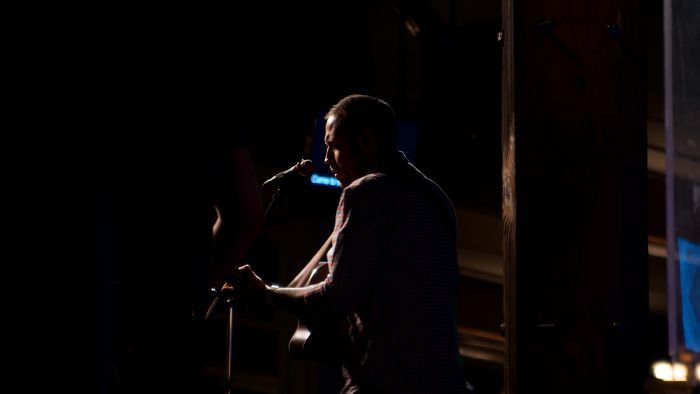Over the last few years as a worship leader, I have experienced a subtle, growing discontent with some of the forms and expectations that have accompanied the worship-as-concert model that is prevailing in many churches around the country. I was there in the church when the worship wars came. I saw the reactionaries on both sides. I even picked a side. When I was in eighth grade, I played the drums at a Sunday night service and in that moment I watched people get up and leave. They never came back. I was on the bandwagon to help make the church service relevant again.
Music, style, and fashion are preferences and they all produce visceral reactions in us. How we feel about these things, in the schoolyard and the sanctuary, tell us whether we're cool or not. Are you in or are you out? The crazy thing is, none of these dividing issues in the church have anything to do with the content or substance of songs and sermons.
For the Christian, relevance is not adequately measured by style or emotional impact. Relevance is measured by truth.
The Order of Worship
Like many millennials who grew up in church, I was brought up in a worship music landscape dominated by a few powerhouse ministries. Their songs sung of the reverence we wanted to have. We were always falling, shouting, trembling, and laying everything down. We sang about what we hoped for and didn't do. We measured the effectiveness of our worship by how it made us feel. We brought our sacrifice to the temple.
In his book “Rhythms of Grace”, author Mike Cosper gives a summary of the “Temple Model” of worship that I’m writing about. He says:
"The journey begins in the 'outer gates', where the crowd assembles rambunctiously, with celebrative and energetic music. As worship continues into the inner gates and into the temple, music becomes more intimate and the presence of God becomes more immanent. The goal of worship is to enter the Holy of Holies, where God's presence is most profoundly known and experienced. Once there, we sing only ballads and hymns, with tears streaming down our collective face."
It's a fast to slow, shallow to deep, accessible to sacred, outer courts to holy-of-holies model of worship that is more concerned with our emotional journey than our understanding of Gospel truths. The format of our worship cannot save us, but the truth of the Gospel can set us free (John 8:32). If that's the case, then we should model the format of our worship after the Gospel story.
Gospel Centered Worship
Over the last year I have heard the phrase "Gospel Centered Worship" more times than I can count. In November, I had the privilege to attend the “Doxology and Theology Conference” and, again, I could not escape those three words.
So what is “Gospel Centered Worship”?
Again, I’ll reference Mike Cosper and “Rhythms of Grace”. (Cosper himself gleaned much of the content of his chart from Bryan Chappell’s “Christ-Centered Worship”). In the following chart we see three things which happen in a gospel-centered worship service: 1.) we experience the Gospel, 2.) we remember the Story of the Gospel, and 3.) we act as participants in our service (or what is often called, “a liturgy”). This chart progresses downward as we advance through our services on Sunday.
| Experiencing the Gospel | Remembering the Story | Actions in Liturgy |
|---|---|---|
| God is holy. | Creation | Adoration |
| We are sinners. | Fall | Confession (and/or) Lament |
| Jesus saves us. | Redemption | Assurance, Thanksgiving, Petition, Instruction |
| Jesus sends us. | Consummation | Communion, Charge, Blessing |
For our context at Sovereign Hope Church, my worship planning looks like this:
CALL TO WORSHIP
This is a scripture reading that inspires us to sing about God. He's the object and author of our worship. This is often from the Psalms, but just recently it was from Luke 2 where the Angels proclaimed to the shepherds the glory of God.
GOD IS HOLY
Our first song is a song of adoration. At the start of our service, we sing about the character and nature of God. He's infinite, unchanging, majestic and awe-inspiring.
WE ARE SINNERS
We move to sing our confession, and sing songs that proclaim our great need. Understanding the offense of our sin and having a right view of it makes the death of Christ in our place all the more awesome and wonder producing. We won't truly rejoice in the position that Christ has purchased for us if we don't acknowledge and believe that we deserved the wrath of God that He bore for us.
JESUS SAVES US
How beautiful it is to sing about what Christ accomplished. Only Jesus takes away the sins of the world. In Christ we are free from the penalty of sin and we've not only had our debt paid, but we've inherited the righteousness of God. We have been made daughters and sons of God because of the work of Jesus.
JESUS SENDS US
We leave Sunday singing about what salvation enables and compels us to do. We bring the good news of salvation through Christ to our families, our neighbors, our communities, and our world.
A Liturgy that Brings Life
If you're reading this, and you're a part of our Church body at Sovereign Hope, I would encourage you to look for this pattern in our worship service. Find it, and hold on to it. Sing the Gospel story and let it bring life like a fountain that never runs dry. (John 4:14) If you'd like to hear a playlist of songs that lead through a Gospel Centered Worship plan, I've created one and included it below. May God bless us all as we're faithful to remember and sing of the good news of our Lord Jesus Christ.




